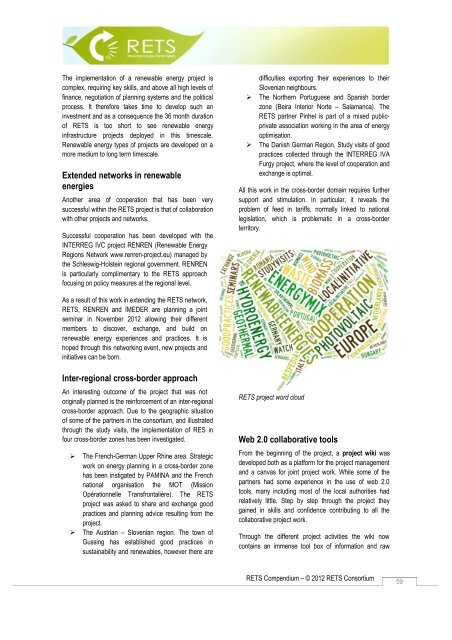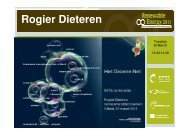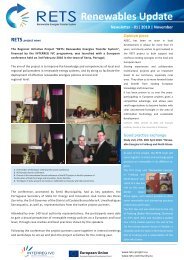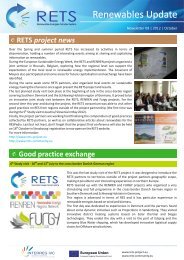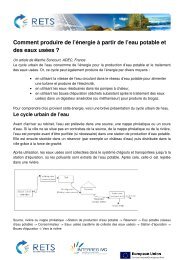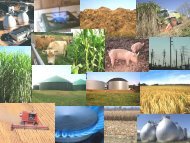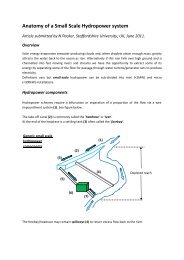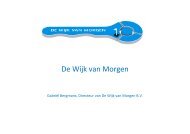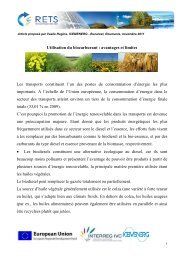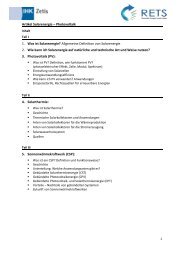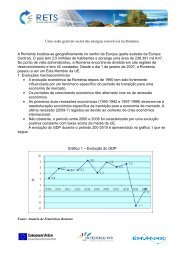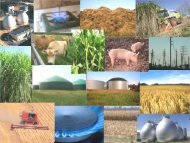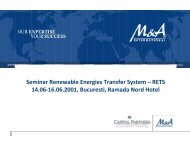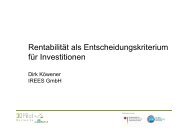Promoting renewable energies - RETS Project
Promoting renewable energies - RETS Project
Promoting renewable energies - RETS Project
Create successful ePaper yourself
Turn your PDF publications into a flip-book with our unique Google optimized e-Paper software.
The implementation of a <strong>renewable</strong> energy project is<br />
complex, requiring key skills, and above all high levels of<br />
finance, negotiation of planning systems and the political<br />
process. It therefore takes time to develop such an<br />
investment and as a consequence the 36 month duration<br />
of <strong>RETS</strong> is too short to see <strong>renewable</strong> energy<br />
infrastructure projects deployed in this timescale.<br />
Renewable energy types of projects are developed on a<br />
more medium to long term timescale.<br />
Extended networks in <strong>renewable</strong><br />
<strong>energies</strong><br />
Another area of cooperation that has been very<br />
successful within the <strong>RETS</strong> project is that of collaboration<br />
with other projects and networks.<br />
Successful cooperation has been developed with the<br />
INTERREG IVC project RENREN (Renewable Energy<br />
Regions Network www.renren-project.eu) managed by<br />
the Schleswig-Holstein regional government. RENREN<br />
is particularly complimentary to the <strong>RETS</strong> approach<br />
focusing on policy measures at the regional level.<br />
difficulties exporting their experiences to their<br />
Slovenian neighbours.<br />
The Northern Portuguese and Spanish border<br />
zone (Beira Interior Norte – Salamanca). The<br />
<strong>RETS</strong> partner Pinhel is part of a mixed publicprivate<br />
association working in the area of energy<br />
optimisation.<br />
The Danish German Region. Study visits of good<br />
practices collected through the INTERREG IVA<br />
Furgy project, where the level of cooperation and<br />
exchange is optimal.<br />
All this work in the cross-border domain requires further<br />
support and stimulation. In particular, it reveals the<br />
problem of feed in tariffs, normally linked to national<br />
legislation, which is problematic in a cross-border<br />
territory.<br />
As a result of this work in extending the <strong>RETS</strong> network,<br />
<strong>RETS</strong>, RENREN and IMEDER are planning a joint<br />
seminar in November 2012 allowing their different<br />
members to discover, exchange, and build on<br />
<strong>renewable</strong> energy experiences and practices. It is<br />
hoped through this networking event, new projects and<br />
initiatives can be born.<br />
Inter-regional cross-border approach<br />
An interesting outcome of the project that was not<br />
originally planned is the reinforcement of an inter-regional<br />
cross-border approach. Due to the geographic situation<br />
of some of the partners in the consortium, and illustrated<br />
through the study visits, the implementation of RES in<br />
four cross-border zones has been investigated.<br />
The French-German Upper Rhine area. Strategic<br />
work on energy planning in a cross-border zone<br />
has been instigated by PAMINA and the French<br />
national organisation the MOT (Mission<br />
Opérationnelle Transfrontalière). The <strong>RETS</strong><br />
project was asked to share and exchange good<br />
practices and planning advice resulting from the<br />
project.<br />
The Austrian – Slovenian region. The town of<br />
Gussing has established good practices in<br />
sustainability and <strong>renewable</strong>s, however there are<br />
<strong>RETS</strong> project word cloud<br />
Web 2.0 collaborative tools<br />
From the beginning of the project, a project wiki was<br />
developed both as a platform for the project management<br />
and a canvas for joint project work. While some of the<br />
partners had some experience in the use of web 2.0<br />
tools, many including most of the local authorities had<br />
relatively little. Step by step through the project they<br />
gained in skills and confidence contributing to all the<br />
collaborative project work.<br />
Through the different project activities the wiki now<br />
contains an immense tool box of information and raw<br />
<strong>RETS</strong> Compendium – © 2012 <strong>RETS</strong> Consortium<br />
59


